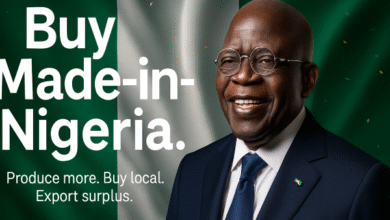Tinubu Lists 12 Economic Milestones in Two Years for Nigeria’s Growth

Nigeria marked its 65th Independence anniversary on October 1, 2025, with President Bola Ahmed Tinubu delivering a national broadcast that doubled as both a celebration and a scorecard. The president highlighted 12 economic milestones achieved by his administration within two years, pointing to a stabilising economy, fiscal reforms, and new investments in critical sectors.
While critics argue reforms have brought hardship through fuel subsidy removal, inflationary spikes, and exchange rate volatility, Tinubu insists “the worst is over.” He maintains that his policies are laying the groundwork for sustainable, diversified, and inclusive growth—a bold claim at a time when investors, businesses, and households continue to navigate uncertainty.
Key Economic Milestones Unveiled
In his address, Tinubu listed 12 headline achievements, which we summarise below:
- GDP Growth Recovery – Q2 2025 GDP expanded 4.23%, Nigeria’s fastest in four years, outpacing IMF’s 3.4% projection.
- Inflation Control – Headline inflation fell to 20.12% in August 2025, the lowest in three years.
- Non-Oil Revenue Surge – Nigeria surpassed its ₦20 trillion non-oil revenue target by August, with ₦3.65 trillion raised in September alone—a 411% increase from May 2023.
- Fiscal Health Restored – Debt service-to-revenue ratio dropped from 97% to below 50%.
- External Reserves Growth – Reserves rose to $42.03 billion, highest since 2019.
- Tax-to-GDP Ratio – Increased to 13.5%, with further expansion expected when new tax law takes effect in January 2026.
- Trade Surplus – Achieved five consecutive quarters of trade surplus; Q2 2025 surplus reached ₦7.46 trillion, up 44.3%.
- Oil Sector Revival – Daily crude oil output rebounded to 1.68 mbpd from 1 mbpd in May 2023; Nigeria now refines PMS domestically for the first time in 40 years.
- Currency Stabilisation – FX reforms closed gaps between official and parallel rates, removing arbitrage opportunities.
- Social Investment Expansion – ₦330 billion disbursed to 8 million households under conditional cash transfers.
- Stock Market Boom – All-Share Index jumped from 55,000 points in May 2023 to 142,000 points in September 2025, signalling investor confidence.
- Infrastructure Growth – Completion nearing on Kano-Katsina-Maradi and Kaduna-Kano rail lines, Lagos-Calabar Coastal Highway, and Sokoto-Badagry expressway.
Sector-by-Sector Analysis
1. Fiscal and Monetary Stability
The government’s fiscal reset—ending fuel subsidies, restructuring “Ways and Means” advances, and boosting non-oil revenue—has reduced Nigeria’s debt vulnerability. The first interest rate cut in five years signals confidence in macroeconomic stability.
Implication: Investors see Nigeria as a market returning to disciplined fiscal management, though rising taxes and compliance costs may squeeze businesses in the short term.
2. Oil & Gas
Increased oil output, Niger Delta security gains, and PMS domestic refining mark a structural turnaround. Nigeria’s emergence as Africa’s top aviation fuel exporter is significant.
Implication: Energy investors are likely to deepen stakes, but labour unrest (e.g., PENGASSAN strikes) and the subsidy debate remain major risks.
3. Non-Oil Sectors
The biggest story is Nigeria’s non-oil export surge, which now accounts for nearly half of total exports. Solid minerals, agriculture, and manufacturing are beginning to shape trade patterns.
Implication: Export diversification boosts FX stability and offers new value chains for SMEs, but logistics and power bottlenecks must be fixed.
4. Infrastructure
Tinubu’s administration has doubled down on transport, rail, and road megaprojects, with $3 billion earmarked for the Eastern Rail project.
Implication: Construction, cement, steel, and logistics companies will see new contracts and expansion opportunities, but funding gaps remain.
5. Social Policy
Cash transfers to 8 million households highlight a safety-net approach amid reforms. However, inflation still erodes purchasing power for many Nigerians.
Implication: Social investments will cushion unrest, but without job creation, long-term poverty reduction remains elusive.
6. Capital Markets & Finance
The Nigerian Stock Exchange is booming, reflecting strong investor confidence in reforms. FX stability has improved, attracting portfolio inflows.
Implication: Capital markets will remain bullish if reforms deepen, but structural weaknesses (power, insecurity, governance) could trigger volatility.
Economic Implications
- Short-Term Pain: Fuel subsidy removal and FX reforms sparked hardship but unlocked fiscal space.
- Medium-Term Gains: Stronger reserves, trade surplus, and debt sustainability signal resilience.
- Long-Term Transformation: Non-oil diversification, infrastructure push, and tax reforms could reposition Nigeria as Africa’s investment hub.
BRANDECONOMY Takeaways for Decision-Makers
- For Investors: Nigeria’s fiscal reforms and booming stock market present opportunities in energy, infrastructure, and consumer goods. But risks—labour unrest, insecurity, and political pushback—must be hedged.
- For Policymakers: Expanding the tax base without overburdening existing payers is key. Social cushions must be scaled up to preserve reform legitimacy.
- For Businesses: FX reforms and trade surplus create export opportunities, but firms must adapt to higher compliance and tax reporting.
For Citizens: Relief may come slower than promised, but non-oil diversification and social transfers could eventually translate to more jobs and lower costs.











